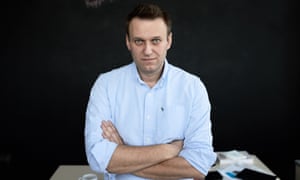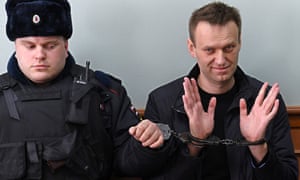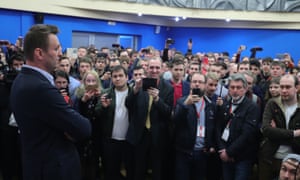
A
lexei Navalny is in good spirits for a man who can hardly step outside without being insulted, assaulted or arrested. Earlier this month he was released from a 15-day stint in a Russian jail. And on Thursday, in Moscow, unknown assailants threw green dye in his face, the second such attack in recent months. But his habitual half-smirk never seems to waver.
Perhaps it is because, as Vladimir Putin prepares to stand for yet another presidential term in elections next March, Navalny is threatening to bring some life to the arid landscape that is Russian politics. Navalny was imprisoned because of a protest he called for on 26 March. It surprised everyone with its size. In Moscow alone, police detained more than 1,000 people, and jailed dozens. Although the numbers were small in absolute terms, people protested in dozens of towns across Russia, marking a worrying new development for the Kremlin.
”Navalny, 40, is a lawyer-turned- campaigner whose Anti-Corruption Foundation carries out investigations into the wealth of Putin’s inner circle. After some years when he was on the fringes of liberal politics but known for his Russian nationalist views, Navalny emerged as the main opposition leader in the wave of protests that accompanied the build-up to the last Russian presidential election, in 2012.
The day he was arrested, security agents showed up at his office, packed up all the electronics and walked off with them. When I visit, nothing has yet been returned. He is working on a MacBook with a sticker on it bearing the three-letter Russian word “VOR”, meaning “thief”. A grotesque caricature of Putin’s face peers at me through the O.
Putin’s spokesman Dmitry Peskov looks down at us from a calendar released by the foundation, listing its key investigations. In 2015, Navalny alleged that Peskov had spent his honeymoon on one of the world’s most expensive sailing boats, and spotted him wearing a limited-edition watch worth hundreds of thousands of pounds. (Peskov denied the boat trip and said the watch was a wedding gift.) Navalny has also accused deputy prime minister Igor Shuvalov’s wife of using a private jet to fly her pet corgis around Europe, and obtained drone footage of the palatial residences of other ministers and top officials.
Medvedev dismissed the allegations as “lies” from a “political imposter”. But even though state television has ignored the allegations, nearly 20 million people have viewed Navalny’s YouTube video. Navalny believes that as poverty continues to blight large swaths of Russia’s population, the mood of protest will only grow. Even the police are angry about government corruption, Navalny claims.

“The cops who arrest me” – Navalny has been detained or
arrested multiple times – “always say: ‘We support you, you’re a good guy,
we’ve seen the films, Medvedev is taking the fucking piss, but Putin’s foreign policy is great. Of course,
the internal policies aren’t so good.’” This chimes with what I have heard on
my trips around Russia: people are miserable about their own situations, but
believe Putin’s interventions in Ukraine and Syria have saved the world from US
hegemony.
And these days it’s not just in Russia that Putin is seen as all-powerful. I ask Navalny about the current alarm over Kremlin interference in the west. He chuckles at the idea that Donald Trump is somehow a “Russian agent” and thinks the west has become hysterical about Russia, but he also says it’s clear the Kremlin will attempt to buy influence where it can, and thinks western politicians come surprisingly cheap.
“For these guys, a billion dollars is nothing,” he says, cocking his head towards the calendar featuring Putin’s inner circle. “And for just a billion dollars you can buy up all the small parties of Europe.
Navalny says he does his best to counter TV propaganda about renewed Russian influence when campaigning in the regions. “I tell them: ‘OK great, so Putin is promising to rebuild Palmyra, but why don’t you look at the roads in your city? What do you think the priority should be? Fixing the roads in Voronezh or Stavropol or rebuilding Palmyra? The Americans are loaded. Let them fix Palmyra, and we should concentrate on our own problems.’
And these days it’s not just in Russia that Putin is seen as all-powerful. I ask Navalny about the current alarm over Kremlin interference in the west. He chuckles at the idea that Donald Trump is somehow a “Russian agent” and thinks the west has become hysterical about Russia, but he also says it’s clear the Kremlin will attempt to buy influence where it can, and thinks western politicians come surprisingly cheap.
“For these guys, a billion dollars is nothing,” he says, cocking his head towards the calendar featuring Putin’s inner circle. “And for just a billion dollars you can buy up all the small parties of Europe.
Navalny says he does his best to counter TV propaganda about renewed Russian influence when campaigning in the regions. “I tell them: ‘OK great, so Putin is promising to rebuild Palmyra, but why don’t you look at the roads in your city? What do you think the priority should be? Fixing the roads in Voronezh or Stavropol or rebuilding Palmyra? The Americans are loaded. Let them fix Palmyra, and we should concentrate on our own problems.’
A few days later, I meet Navalny again in Chelyabinsk, a two-hour flight east of Moscow. It is one stop on a tour of dozens of cities that he has undertaken ahead of standing in the March presidential 2018 election. An industrial city with a population of just over a million, Chelyabinsk is filled with decaying, Soviet-era factories that emit so much pollution that when you inhale, the air stings the back of the nostrils like wasabi. It’s a Putin heartland, but also the kind of place where the economic hardships of the last few years have been felt most acutely. Navalny and his team arrive late at night, after a bone-crunching six-hour drive from Tyumen, where he opened a campaign headquarters the day before.
In other towns on the campaign trail, he has been assaulted or insulted as he tries to meet with locals. Bomb threats are phoned into venues where he is speaking, leading to the police evacuating them. In Chelyabinsk, the day passes relatively peacefully. In the morning, he speaks to young locals who want to volunteer to help get his presidential campaign underway. There are a couple of hundred people there, many from the city’s nascent hipster class. It’s an impressive turnout, but these people are Navalny’s natural support base. More interesting is how his message goes down later in the day, when he speaks at an environmental protest, against the construction of a new mining and processing plant that will pollute the atmosphere even more.
The local authorities take no chances with their inconvenient guest from the capital. The children’s playground where the rally takes place is surrounded by five police buses, a detachment of riot police in cosmonaut helmets, a bevy of Cossacks who look ready for a fight, and some brawny youths who have shown up, almost certainly on the orders of the authorities, to disrupt proceedings.
“This is an environmental gathering, please behave in a dignified manner,” pleads the frazzled organiser, as 50 or so people begin chants of “Go away!” and “Shame!” the minute Navalny’s name is mentioned.
He takes the stage with a grin. “Let me explain something to you – I’ve got a microphone and you haven’t, so this is all a bit pointless,” he shouts jovially, as the young men keep chanting. “But look, if you don’t like me, don’t vote for me. I’ve come today, and I’ll be leaving this evening. But the plant will stay here, and it’s going to poison you, and your families. Is that what you want? Keep chanting if that’s what you really want.” The provocateurs, extraordinarily, pipe down. Some of them even look a bit ashamed, and listen as Navalny launches into a characteristic rant about Putin’s “crooks and thieves” who are stealing their money and poisoning their cities.
Russia is a country where politicians rarely have to do anything as risky as meeting with real people, and when it does happen by accident, it tends to end in disaster – witness the hapless Medvedev, on a visit to Crimea, telling a group of elderly women distraught about their low pensions that “there’s no money, but all the best, good health to you, bye!” before sauntering off. Many in the opposition also seem hopelessly detached from the masses – the curse of the Russian liberals since tsarist times. But whether they love him or hate him, most Russian observers agree that Navalny has remarkable political instincts and a powerful charismatic streak. His fiery cocktail of liberalism, nationalism and populism resonates with many.“People say he’s a provocateur, that’s he’s paid from abroad,” says 62-year-old Nadezhda, listening on in Chelyabinsk. “Is that true? I don’t know. But at least he’s come to speak to us, at least he says the right things. Nothing ever gets done here, nobody ever listens.”In Russia, where no conspiracy is too outlandish to be considered, some see Navalny as a puppet of the rapacious west, while others suspect him of having a Kremlin backer, perhaps even Putin, using him to pour dirt on inconvenient members of the elite. “I’d find him much more trustworthy if he was dead,” one liberal Muscovite said to me, only half-jokingly, a few days before the interview. “How can he be doing what he’s doing and still be alive? He must have a powerful backer.”
I put this question to Navalny, with a parenthesised apology attached. “Fucking morons,” he says, irritably. “‘Why haven’t they killed you, why haven’t they locked you up?’ People are always asking me this. Look, I have no answer to that question. I suppose the most likely is that they didn’t manage to lock me up when they could have done easily, and then after a certain point it became more difficult.”It is probable that many of the tip-offs for his various investigations do come from Kremlin insiders; underneath the surface loyalty, a brutal battle for power and influence goes on inside the Russian elite. But even if they have occasional uses for him, Putin’s men have long grappled with the issue of how to deal with Navalny.
The Kremlin has tried different strategies: launching court cases, keeping him under house arrest and even jailing his brother in an apparent attempt to put pressure on him. Sometimes they even tried to crush him honestly: he was allowed to run for mayor of Moscow in 2013. But despite having no access to state television, he won 27% of the vote, which alarmed the Kremlin, and in 2014 he was placed under house arrest while awaiting a new, politicised trial.
I visited him then, at his modest apartment in an unglamorous suburb of Moscow, where he still lives with his wife, Yulia, and their two children. He was as defiant as ever, but seemed sidelined in the newly patriotic atmosphere after the annexation of Crimea. Hardly anyone seemed to notice his absence from the political scene as he spent months banned from speaking with the media or leaving his flat.Now, as the “Crimea effect” wanes and economic difficulties continue, the Kremlin is finding it harder to mobilise the population ahead of next year’s vote. The presidential administration is on the hunt for someone who could provide token opposition to Putin, but it is not likely to be Navalny. “Too much unpleasant noise,” a source close to the Kremlin told me. “They want someone who will give off the impression of competition, but will not actually attack Putin and the inner circle. They need someone who understands the limits, and Navalny does not recognise any limits.”
The video was a hamfisted smear attempt, but Navalny does have questions to answer about his nationalist views. Several years ago, he released a number of disturbing videos, including one in which he is dressed as a dentist, complaining that tooth cavities ruin healthy teeth, as clips of migrant workers are shown. In another video, he speaks out in favour of relaxing gun controls, in a monologue that appears to compare migrants to cockroaches.
Instead, the Kremlin has gone into attack mode. Last week, Russian news outlets reported a secret Kremlin directive to “blacken” Navalny, and sure enough, a video soon appeared on YouTube comparing him to Hitler, complete with photoshopped images of Navalny sieg heiling, wearing a swastika armband. There were reports that university students had been shown the video as part of “educational events” designed to stop them from protesting.
I ask him if he regrets those videos now, and he’s unapologetic. He sees it as a strength that he can speak to both liberals and nationalists. But comparing migrants to cockroaches? “That was artistic license,” he says. So there’s nothing at all from those videos or that period that he regrets? “No,” he says again, firmly.
Perhaps he has a cynical belief that, with the support of the liberal elite sewn up, the anti-migrant rhetoric can potentially help him appeal to a broader audience. Certainly, most opposition politicians, even if they don’t like Navalny much, are aware that he is the best hope for swelling anti-Putin sentiment.
Navalny has announced another Russia-wide protest on 12 June. The turnout that day will be a good indicator of whether last month’s protest was a flash in the pan, or the start of something seriously threatening for the Kremlin. “You can arrest 100 people and jail them for 15 days. OK, you can jail 1,000 people across the country. But then what?” Before then, he plans dozens more trips across Russia to drum up volunteers to help launch his presidential bid.After a long day in Chelyabinsk, he looks exhausted, but happily signs autographs for people who approach our table in the airport cafe. I notice that it’s 100 years to the day since Vladimir Lenin arrived at St Petersburg’s Finland Station, in April 1917, spewing radical theses that few took seriously – at least initially. Most Russians, given a combination of very real historical tragedy and careful Kremlin messaging, are wary of revolution or upheaval.

Is there a danger, I ask Navalny, that Putin’s actions over the past years have turned the Kremlin insistence that any political change would be disastrous for Russia into a self-fulfilling prophecy? There’s no outlet for healthy opposition, and any revolutionary uprising would surely be brutally crushed. He sighs, like a teacher irritated with a particularly slow pupil.
“Look, of course the regime will fight back. But all autocratic regimes come to an end. Who would have thought in 1985 that the Soviet Union would all come to an end before long? Nobody. Who would have guessed, in 2010, that the Arab regimes would be over in three months? In 2012, I said the regime would last two more years, and I was wrong, so I’ve stopped making predictions. But sooner or later, it will all come to an end.”
No comments:
Post a Comment